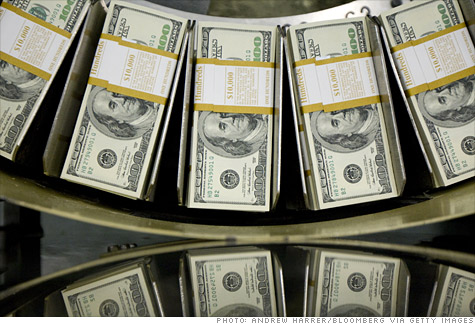
FORTUNE -- Imagine a world without the almighty greenback as the main reserve currency.
It's not an easy thought. The U.S. dollar has long been the global currency of choice. As much as 64% of the world's currency reserves are held in greenbacks, according to the International Monetary Fund.
But given the manic ups and downs of the dollar in recent years, it may finally be time to diversify the world's reserves. And that's exactly what some central bankers around the globe are now doing.
This comes as a growing number of economists and policymakers are calling to move away from the greenback as the world's dominant currency. A recent United Nations report says the dollar's movements have been too erratic to hold value and the U.N. urges central banks to replace it with anything but a single currency or even multiple-national currencies.
One potential replacement is special drawing rights (SDRs), the international reserve created by the IMF in 1969. SDRs aren't something you can carry in your pocket like cash. They represent potential claims on currencies of IMF members. Because the value of SDRs is based on a basket of the world's major currencies (U.S. dollars, yen, euros and pounds), its value typically isn't as volatile as a single currency. Central bankers in Russia and China have supported the idea of SDRs.
"I think there is a general sense that these recommendations are at least worth debating," says José Antonio Ocampo, a Columbia University professor who served on a U.N. expert commission that considered ways of overhauling the global financial system. Ocampo says lessons learned following the financial crisis have renewed interest in the development of a global multi-currency system including SDRs.
The latest U.N. report isn't the first time there's been a call for lesser reliance on the greenback. The idea of a global currency has been around for decades, with the late British economist John Maynard Keynes going as far as to favor the concept of an independent global central bank with its own currency.
These ideas are unlikely to take off anytime soon, but it appears momentum is at least gaining to give the global reserve system a new face.
SDR reserves: Still an idea ahead of its time
Last April the G20 countries, which include the wealthiest nations plus major emerging economies such as China, Brazil and India, authorized the IMF to issue $250 billion in new SDRs to help countries bolster reserves amid the global financial crisis. The move was rare and significant. The last SDR allocation of $21.4 billion was proposed in 1997, but it never went into effect because it fell short of the required IMF votes.
The IMF typically makes loans to countries denominated in SDRs, which can be converted to whatever national currency the borrower desires at the daily exchange rate. At today's exchange rate, $1 million would translate to 670,000 SDRs.
Though the greenback has strengthened against the euro recently, it has lost more than a quarter of its value over the past eight years. This is particularly worrisome for emerging-market nations that hold larger quantities of dollar-denominated debt mostly in U.S. Treasury securities. Not only has the value of the dollar declined, but official interest rates are close to zero, and yields on bonds are at record lows.
Central bankers have acted on their worries of holding U.S. debt amid soaring U.S. deficits and slow growth. A Morgan Stanley report earlier this month noted that central banks have grown weary of the greenback. During the first quarter, they reduced their allocation to U.S. dollars by almost one percentage point to 57.3% from 58.1% and have raised allocations of other currencies -- chiefly the Australian and Canadian dollars.
"[U.S. dollars] remain the greatest weight in reserves, but over time we anticipate that reserve managers may reduce their holdings further," a Morgan Stanley analyst wrote in the July 8 report.
Despite doubts of the dollar, it's still the currency most economies favor relative to other currencies, and it will likely remain so for the foreseeable future. Much of this has to do with ease of transactions as the dollar is still positioned nicely as the dominant international medium of exchange.
SDRs and the kind of global currency that Keynes supported are much farther off. Nevertheless, the world has begun to realize that perhaps the greenback shouldn't always be king. Eventually, the dollar will have to share the reserve throne with others. ![]()






| Company | Price | Change | % Change |
|---|---|---|---|
| Ford Motor Co | 8.29 | 0.05 | 0.61% |
| Advanced Micro Devic... | 54.59 | 0.70 | 1.30% |
| Cisco Systems Inc | 47.49 | -2.44 | -4.89% |
| General Electric Co | 13.00 | -0.16 | -1.22% |
| Kraft Heinz Co | 27.84 | -2.20 | -7.32% |
| Index | Last | Change | % Change |
|---|---|---|---|
| Dow | 32,627.97 | -234.33 | -0.71% |
| Nasdaq | 13,215.24 | 99.07 | 0.76% |
| S&P 500 | 3,913.10 | -2.36 | -0.06% |
| Treasuries | 1.73 | 0.00 | 0.12% |
|
Bankrupt toy retailer tells bankruptcy court it is looking at possibly reviving the Toys 'R' Us and Babies 'R' Us brands. More |
Land O'Lakes CEO Beth Ford charts her career path, from her first job to becoming the first openly gay CEO at a Fortune 500 company in an interview with CNN's Boss Files. More |
Honda and General Motors are creating a new generation of fully autonomous vehicles. More |
In 1998, Ntsiki Biyela won a scholarship to study wine making. Now she's about to launch her own brand. More |
Whether you hedge inflation or look for a return that outpaces inflation, here's how to prepare. More |